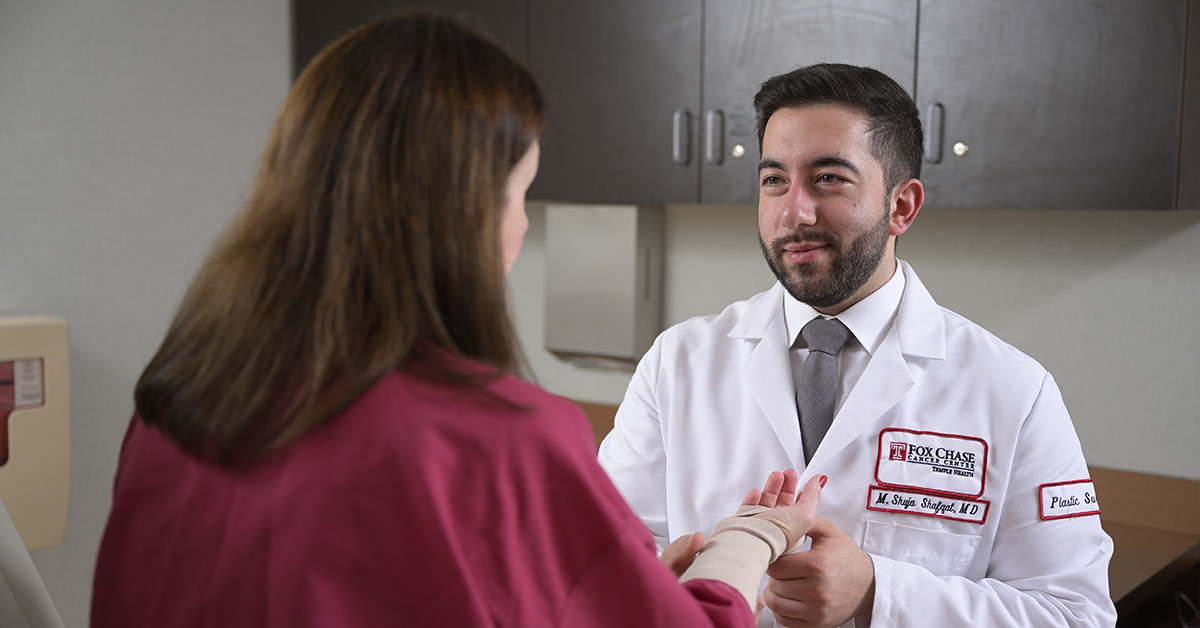
Surgical Treatment Options for Lymphedema
-
Many cancer patients cope with lymphedema, a side effect caused by a number of different cancer treatments. Though it can be a long-term problem, there are many treatment options—including surgery. Here’s what you need to know.
What is lymphedema?
Lymphedema occurs when the lymph system becomes blocked or damaged. As a result, fluid builds up in the soft tissues of the body and causes swelling. The body’s immune system also doesn’t work as well in these areas and they are at risk for developing an infection in the skin. Cancer and its treatments are a common cause of lymphedema.
People who’ve had lymph nodes removed during surgery or had radiation treatment are at risk, but anyone with a damaged lymph system can develop lymphedema. Without treatment, lymphedema can make a limb swell out of proportion. It can limit movement, harden skin, and cause wounds and infection.
When is surgery a good choice?
The most common and gold standard treatments for lymphedema are conservative, such as bandaging, compression garments to control swelling, massage, exercise, and therapy with a certified lymphedema therapist.
Surgery can be an option for people who’ve tried these more conservative therapies but are still having problems with swelling. It can reduce the risk of infection.
“Usually, we recommend six months of conservative management with a certified lymphedema therapist to see if therapy is helpful,” said M. Shuja Shafqat, MD, plastic and reconstructive surgeon at Fox Chase Cancer Center. “Patients have to show that they are willing to go through the rigors of the surgical process, including recovery. Surgery is not a cure—there is no cure for lymphedema. Patients are still likely to need massage, wraps, and therapy; but, the earlier we can tackle the problem with surgery, the better.”
What types of surgery are available?
There are two major categories of surgical procedures for lymphedema:
- Ablative. These procedures remove skin and soft tissue in affected areas, and may involve skin grafts. Ablative surgeries aren’t common anymore. “Ablative procedures are fraught with complications,” Shafqat said. “Liposuction is the primary ablative surgery that we do. That’s for patients with later stages of lymphedema who don’t have a lot of fluid in their extremities.”
- Physiologic. These surgeries, two of which are lymphovenous bypass and vascularized lymph node transfer, change what’s happening with the lymphatic fluid. Physiologic procedures are evolving and becoming more popular.
Surgeons at Fox Chase perform both kinds of procedures, but they specialize in innovative physiologic surgeries.
“For instance, with lymphovenous bypass, we bypass lymphatic channels into veins, and that redirects the flow of lymph fluid,” Shafqat said. “With vascularized lymph node transfer, we take lymph nodes from another part of the body and transfer them to the affected extremity to replace damaged or missing lymph nodes and to create new pathways for lymph drainage.”
Transferring nodes can be delicate, but the lymphedema care teams at Fox Chase make these decisions on an individual basis.
“There’s always a small risk of causing lymphedema in areas where we take nodes from—some have a lower risk than others, and there are ways to reduce the risk of that happening,” Shafqat said.
What should I look for in a lymphedema surgeon?
Surgeries for lymphedema treatment are rare, and surgeons that perform specialized lymphedema surgical procedures need to be highly skilled. So, where you go for care matters.
“These procedures aren’t performed everywhere, even by most plastic surgeons,” Shafqat said. “Look for a place that performs these and has a track record of performing them. Make sure they have certified lymphedema therapists too.”
Fox Chase has been recognized by the National Lymphedema Network and is one of the few centers on the East Coast to offer cutting-edge physiologic surgery for lymphedema. It also has certified lymphedema therapists who have specialized training to manage the disease.
To make an appointment with a Fox Chase lymphedema surgeon or therapist, call 888-FOX-CHASE (888-369-2427).
Learn more about lymphedema treatment at Fox Chase Cancer Center.
